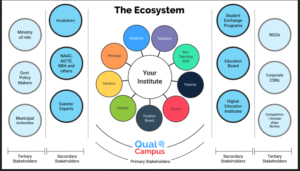Choice Based Credit System or CBCS allows students to study subjects across disciplines. CBCS is commonly used by universities in the United States and other western universities.
Infact it will make our programs and courses at par with the international practices.
Infact it will make our programs and courses at par with the international practices.
Majority of Indian higher education institutions were following the traditional marks/percentage based evaluation system, which hindered the flexibility for the students to study the subjects of their choice and their mobility to different institutions.
Choice Based Credit System (CBCS) allows Students to take Subjects as per their interests and to choose interdisciplinary, intra-disciplinary and skill-based courses.
It is an internationally acknowledged and adopted system, CBCS opens up new opportunities to learn core subjects and explore learning beyond the core subjects, which helps in the overall development of a student. Advantages of the choice based credit system:
1. CBCS shifts from the teacher centred to learner centric education.2. CBCS allows mobility of learners from one institution to another one.
Choice Based Credit System (CBCS) allows Students to take Subjects as per their interests and to choose interdisciplinary, intra-disciplinary and skill-based courses.
It is an internationally acknowledged and adopted system, CBCS opens up new opportunities to learn core subjects and explore learning beyond the core subjects, which helps in the overall development of a student. Advantages of the choice based credit system:
1. CBCS shifts from the teacher centred to learner centric education.2. CBCS allows mobility of learners from one institution to another one.
3. It would take Indian colleges and universities as part of the global standard.
4. helps students to realize their true potentials through the flexibility in offering courses.
5. Helps in broadening the base of the education system.
6. Students may undertake as many credits as they can per their capacity (without repeating all courses in a given semester if they fail in one/more courses).
6. Students may undertake as many credits as they can per their capacity (without repeating all courses in a given semester if they fail in one/more courses).
7. In CBCS students can choose inter-disciplinary(even from other disciplinary), intra-disciplinary courses, skill oriented papers as per their learning needs, interests and aptitude
8. CBCS makes education broad-based and at par with global standards.
9. CBCS offers flexibility for students to study at different times and at different institutions to complete one course (ease mobility of students). Credits earned at one institution can be transferred.
10. CBCS helps employers in assessing the performance of the candidates.
Disadvantages of CBCS:
1. Difficult to calculate the exact marks2. Workload of teachers may increase3. Requires good infrastructure for dissemination of education4. Regular teaching would be affected.5. Mobility of students from one institution to another one would be challenging6. Mastery over one main subject would be affected
1. Difficult to calculate the exact marks2. Workload of teachers may increase3. Requires good infrastructure for dissemination of education4. Regular teaching would be affected.5. Mobility of students from one institution to another one would be challenging6. Mastery over one main subject would be affected
7. It may discourage the gifted and talented learners
All the major University ERP or College ERP supports CBCS, For more information and implementing CBCS ERP, Click here.



